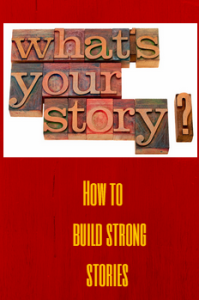Winston Churchill once said: Excellence is … Caring more than others think is wise Risking more than others think is safe Dreaming more than others think is practical Expecting more than others think is possible. Do you like to hear a great story? How about telling stories? Are you using your best storytelling delivery? A great way to spread ideas.

Marketing used to be pretty simple. You developed a compelling message, used mass media to broadcast that message to large audiences, and grew market share. Mostly, you aimed for the meaty part of the curve, where the law of averages conspired in your favor.
Then came the cable TV era. Audiences fragmented and targeting became the order of the day. Instead of starting with the message, marketers thrived on consumer insight and tried to identify a specific emotional trigger that would win them loyal customers.
Now mass marketing has shifted to mass personalization and messaging and targeting have given way to activation. It is no longer enough to simply grab attention, we have to hold attention. Today’s marketers need to inspire movements in which their customers become their best salespeople. We need to make a fundamental shift in mental models.
Using facts are meaningless without a contextual story. Don’t tell facts to influence, tell stories. The more you improve storytelling, the more your influence … it is as simple as that.
American Express’s Open Forum, for example, succeeded because it created stories that supported the narrative of the company’s commitment to small businesses. Pepsi Refresh, on the other hand, failed, in part, because it was unable to connect stories of social responsibility with what had always been a carefree lifestyle brand.
Great storytelling is infinitely more than simply producing content. It is, in fact, no less than helping customers connect with the soul of your enterprise.
Stories make it easier for people to understand. They are the best way, by far, to spread your ideas.
I have been writing, creating ideas, and telling stories to spread ideas for many years.
Here is a checklist we use with our clients to help them continually improve on this important skill:
Storytelling … show energy and emotion
Make it clear to your audience why what we were seeing and hearing matters. Even if it is not always explicitly stated, the message should be clear. Use all of your energy on why your topic matters.
It is hard to choose just one element that a successful story must-have, but if I had to choose just one, I’d say it is this: Show clearly why your topic — or result, cause, mission, etc. — matters. What are the big picture and our place in that picture?
Pixar’s Andrew Stanton said something very similar when he identified the most important element of storytelling as ‘make me care’. You must make the audience care. And you must let them know clearly why they should care.
Observe and use feedback
“Show the readers everything, tell them nothing.” – Ernest Hemingway
Here visual does not mean only the use of graphics such as photography, video, animations, visualizations of data, and so on. Visual also means helping the audience to clearly “see” your ideas through your use of descriptive language, through the use of concrete examples, and by the power and simplicity of metaphor.
Watch your audience carefully and put what you learn to work in the delivery.
Build curiosity
In a great story, the audience wants to know what happens next and most of all how it all concludes. In an explanatory narrative, a series of actions can establish a narrative flow and the sense of journey that is created is one form of anticipation of what comes next.
A good story has a beginning where a sympathetic character encounters a complicating situation, a middle where the character confronts and attempts to resolve the situation, and an end where the outcome is revealed. It does not interpret or explain the action in the story for the audience.
Instead, a good story allows each member of the audience to interpret the story as he or she understands the action. This is why people find good stories so appealing and why they find advertising that simply conveys facts and information boring.
This story was created to market and build the brand. It is a very simple story. It advocates learning to read no matter your age or status in society. To us, it creates pure magic with the story, the visuals, the music, and the emotion.
Create emotion
Whenever I am fortunate enough to see and listen to remarkable stories being told ‘live’ in action, I am struck by their power to pull listeners in, much like a gravitational force that’s impossible to resist.
The best way to pull your audience in is to make them care … emotionally, intellectually, aesthetically. But how do you make the audience care? This is the most fundamental question of all. There is no single answer.
One important answer is having empathy for your audience and trying to craft your story and design your content always with the audience in mind.
Stories in all their many forms are never just about transferring information alone. We are emotional beings, like it or not, and to make the audience care enough to listen to you, you have to evoke in them some kind of emotion.

Use eyes to express
Your eyes speak more than you can imagine. Use them to help your delivery. Spend short bursts looking at individuals in your audience.
Smile
Build rapport and reduce stress. Use stories, analogies, visuals, humor, and metaphors to add color. Maybe not all in one speech, but select and employ to round out the speech.
Mimic
Mimic who you are talking about.
Use your body to show and tell
Inflections up and down add intrigue. Liven things up with hand gestures. Passion beats all … people feel what you feel. Help them feel it. Don’t rush it.
Build-in peaks and valleys with defined points of suspense to create curiosity. Use body language that shows you are comfortable and composed.
Improvise
Learn to adapt in real time.
Related post: Marketing Branding … 9 Secrets to a Continuous Improvement Strategy
The bottom line
Learn to absorb the energy of the audience for your enjoyment. Pay attention to excellent speakers … there are many out there and many on video.
What will have to change is the marketing mindset. The fundamental questions in the coming years will not be how to deploy this or that new technology, but how to can solve fundamental marketing problems, such as how to earn consumers’ trust and how to create experiences that are more impactful, useful, productive, and beneficial.
Take these tips and watch how the experts apply them. They will not all be the same, so pick things you like and apply them to your style. Continuous learning is the key to enjoyment.


